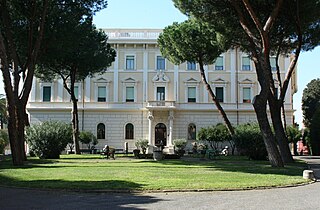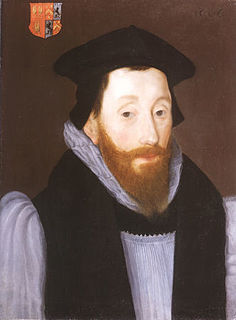This article includes a list of references, related reading or external links, but its sources remain unclear because it lacks inline citations .(March 2019) |
Edmund Griffith (1570–1637) was a Welsh bishop of Bangor.
This article includes a list of references, related reading or external links, but its sources remain unclear because it lacks inline citations .(March 2019) |
Edmund Griffith (1570–1637) was a Welsh bishop of Bangor.
Griffith was born in Lleyn, the promontory of Carnarvonshire, the fourth son of Gruffydd ab Sion Gruffydd of Cevnamlwch. His mother was Catrin, the daughter of Sir Richard Bulkeley of Baron Hill, Anglesey.
Griffith was admitted as an exhibitioner of Brasenose College, Oxford, [1] on 8 April 1587, having been before, in Anthony Wood's opinion, of Jesus College. He proceeded M.A. in 1592. In 1599 he became rector of Llandwrog, in 1600 canon of Bangor, and in 1604 rector of Llanbedrog, both being in the diocese of Bangor. On 10 March 1605 he was instituted archdeacon of Bangor and then on 9 September 1613 dean of Bangor. On the death of Bishop David Dolben he was elected bishop of Bangor on 31 December 1633, confirmed on 12 February 1634, consecrated on 16 February 1634 at Lambeth by Archbishop William Laud, and enthroned on 14 April 1634. He died on 26 May 1637, and was buried in the choir of his cathedral.

Edward Rainbowe or Rainbow (1608–1684) was an English academic, Church of England clergyman and a noted preacher. He was Master of Magdalene College, Cambridge, Vice-Chancellor of the University of Cambridge and Bishop of Carlisle.

Bangor Cathedral is an ancient place of worship in Bangor, Gwynedd, Wales. It is dedicated to its founder, Saint Deiniol.
Alexander Hyde (1598–1667) was an English royalist clergyman, Bishop of Salisbury from 1665 to 1667.
William Moreton was an English prelate in the Church of Ireland who served as the Bishop of Meath from 1705-1716.

Christopher Bethell was Bishop of Bangor.
This article is about the particular significance of the century 1501–1600 to Wales and its people.
Events from the 1050s in England.
Maurice Clenock was a Welsh Roman Catholic priest and recusant exile. He was the first head of the English College, Rome. He was born at Llŷn or Eifionydd circa 1525 and died at sea in 1581.

The Pontifical Irish College is a Roman Catholic seminary for the training and education of priests, in Rome. The College is located in Via dei Santi Quattro, #1 and serves as a residence for clerical students from all over the world. Designated a Pontifical college in 1948, it is the last Irish college in continental Europe.
William Glyn, also known as William Glynn or William Glynne, was the Bishop of Bangor from 1555 until his death.

Andrew Thomas Griffith John is a Welsh Anglican bishop. Since 2008, he has been the Bishop of Bangor in the Church in Wales.

George Lloyd was born in Wales, and became Bishop of Sodor and Man, then Bishop of Chester. He is remembered for Bishop Lloyd's House in Chester, which he had built in the years before his death, and which is recorded in the National Heritage List for England as a designated Grade I listed building.
Robert Skinner was an English bishop successively of Bristol, of Oxford, and of Worcester.
John Towers was an English churchman, Bishop of Peterborough from 1639, a royalist and a supporter of the ecclesiastical policies of William Laud.
Henry Mason was an English clergyman and theological writer.

Robert Morgan was a Welsh Bishop of Bangor.
Henry Rowlands (1551–1616) was a Welsh bishop of Bangor.
Nicholas Robinson was a Welsh bishop of Bangor.

Edmund Weaver was an English politician who sat in the House of Commons at various times between 1646 and 1660.
William Wells was an English clergyman and academic, who served as President of Queens' College, Cambridge and Archdeacon of Colchester.